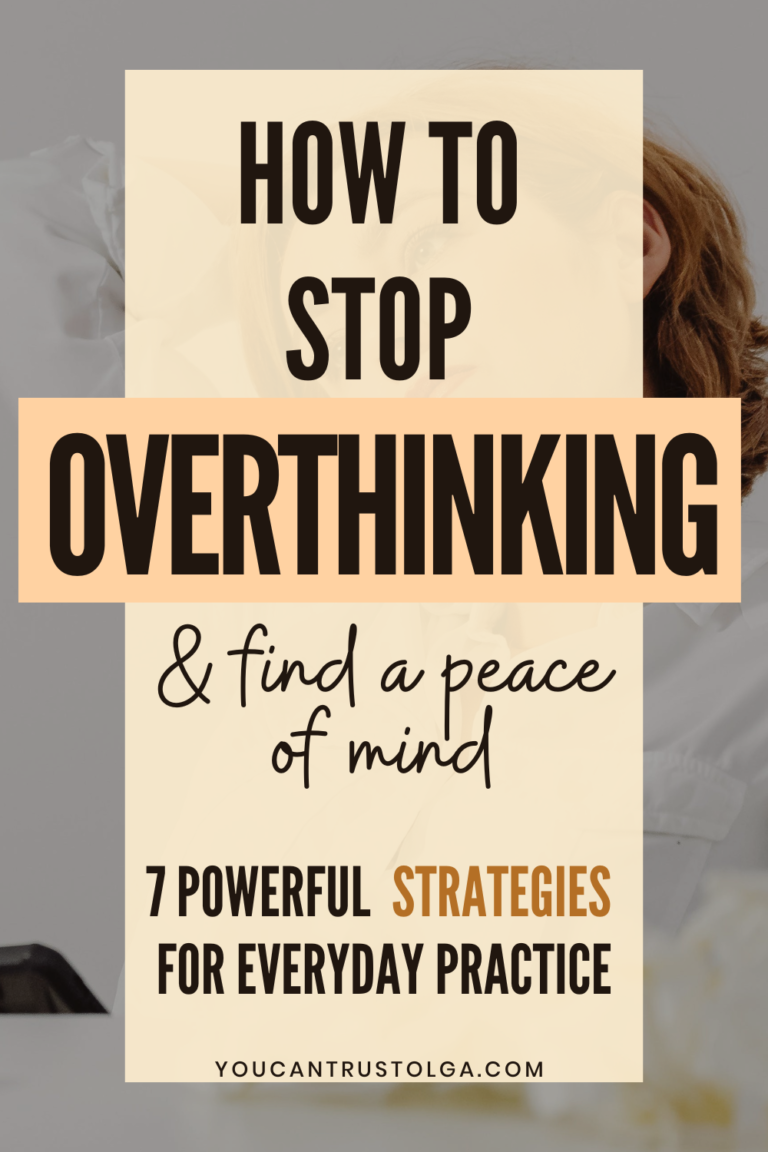Stucking in a mental maze, endlessly circling around the same thoughts and possibilities is the classic case of overthinking. This useless activity is also tiresome and robs us of precious energy.
Let’s be honest, there are better ways to spend our mental fuel than getting stuck in the overthinking cycle.
I recognize how overwhelming this chatter can be at times. That’s why I am excited to share this blog post introducing strategies that will help you tame the monkey in your head and stop overthinking. Let’s get to it!

Thoughts vs Thinking
There is a difference between thoughts and thinking.
Thoughts are mental energy forms, that serve as valuable tools, aiding us in making daily and life decisions. They are the source of all our creative potential.
On the other hand, thinking is active engagement with thoughts. And as we all painfully know, most often to an unnecessary point, which we call overthinking.
Overthinking involves:
- analyzing situations from various angles
- considering multiple possibilities and prolonging decision-making
- hyper-focusing on potential outcomes
- frequently revisiting the same thoughts without reaching a resolution
RELATED READING
Common Reasons for Overthinking
Let’s face it, we don’t have to engage with every thought that comes to our mind.
So, why do we do it? Why, all of a sudden, do we choose to dwell fanatically on a particular thought or problem, to the point it starts causing suffering?
Below are some statements that will help you to understand better what really hides behind overthinking.
- Overthinking is an accustomed way of functioning. In other words, it is a mental habit.
- Most of our mental habits are default. Meaning they were inherent without questioning from the outside world (mostly family) during upbringing.
- Overthinking provides a misleading sense of control.
- Overthinking often is the inability to take responsibility for a choice, that stems from personal insecurities
- Perfectionism (all-or-nothing mentality) is often a precursor for overthinking, implying fears of not being approved or not meeting certain expectations
Potential harm from overthinking
It is a fact that overthinking does us no good.
Instead, it is:
- negatively affects our decision-making,
- creates unnecessary stress, and
- contributes to anxiety,
- lower your self-esteem and increase self-criticism
Examples of overthinking
Here are a few scenarios when overthinking takes over. Maybe you can recognize yourself in one of them.
Scenario 1
You plan to go out with friends. Six of you finally getting together over dinner in one of your favorite restaurants. Suddenly just a few hours before two of your friends decided to change the venue.
Instantly, your mind becomes a whirlwind of thoughts – how to get to the new place, where to find parking, what’s on the menu, and a myriad of other details.
Scenario 2
You are ready to start a new business. The ideas about this venture have been breeding in your head for a while. You are excited about this project, and you really want to get it right.
You spend weeks carefully planning, but still indecisive about whether you are ready to start. You keep postponing the actions and find yourself stuck in the planning phase, overthinking the details, and circumstances and trying to foresee all possible scenarios.
Scenario 3
Your good friend’s birthday is just around the corner. You’ve been anticipating it, even got a thoughtful gift in advance, and now you’re eagerly awaiting the invitation to her annual party. However, as the date draws near, you notice the conspicuous absence of any word from her.
Your brain kicks into overdrive, dwelling on various possibilities. Did she forget to send the invitation? Is there a change in plans? Or is it just you who is not invited? A wave of uncertainty washes over you, and the absence of information becomes a breeding ground for overthinking.
Scenario 4
You are on vacation, and you can’t find your ID. You still have a few days before flying home, and you are almost positive it has to be somewhere in the hotel. You had exciting things planned for the day but now all you can’t think of is the worry of not being able to find it.
7 strategies to stop overthinking

1. Become Aware
The first step towards addressing overthinking is recognizing the moment when it occurs.
It’s akin to hitting the brakes and asking yourself, “What’s happening here?”
This crucial moment of awareness allows you to pause and observe the complex patterns of your thoughts. It becomes evident that revisiting the same thought repeatedly yields no positive outcomes.
Being aware works best when it’s a routine part of your life, not just a now-and-then thing.
That is why it takes conscious effort and intentional practice, to the point it sticks like second nature. It should become a form of game when you catch yourself each time you are in the midst of obsessing over your thoughts.
Once you’re aware, things become clearer. You then see the absurdity of the situation and get a chance to decide: do you want to keep entertaining that thought or let it go? It’s like having a choice in the middle of the mental game.
2. Zoom Out to See the Bigger Picture
Often, we get caught up in trivial matters that won’t have a significant impact on our lives. We can gain different perspectives on the situation if we question the importance and longevity of our worries.
Ask yourself: Will this matter a year from now? What are the potential outcomes, and how likely are they to occur?
Zooming out is an effective mental trick that enables you to see things as they truly are and to fully realize their minuscule and inconsequential significance.
3. Switch Attention from Yourself to Others
One of our biggest problems is that we get overly self-absorbed. Being self-centered is our nature, but very often we easily trap ourselves within the confines of our own neurotic overthinker’s world.
However, there is a simple yet effective method to break free from this cycle of overthinking. Instead of constantly focusing on ourselves, we can shift our attention to others.

Engaging in acts of kindness and compassion, whether it’s volunteering, helping a friend, or simply being there for someone in need does miracles, believe me!
Try a simple experiment. Next time when you are faced with social anxiety and overwhelming concern about the impression you make, redirect your focus toward making someone else feel better instead.
By focusing on others, you give your mind a break from overthinking and create a sense of connection and purpose.
4. Stay Present
Shifting your focus to the present moment, instead of getting lost in the past or future, is a quick and effective rescue from overthinking. Being entirely in the present leaves no room for overthinking or the discomfort that comes with it.
The present moment is the only place where you can be truly happy, complete and worry-free.
Once you try it for yourself, and experience how it works, it could become the most transformational revelation of your life.
Here’s a simple “Return to The Present” guide to follow.
When you find yourself caught up in overthinking bring your attention to your breath; observe 2-3 natural breathing cycles.
Then quickly scan your body – any discomfort or sensations? Check your posture, shoulders, and forehead – are they tense or relaxed? Feel the ground under your feet, and position yourself firmly.
Listen closely to surrounding sounds – how far can you hear? Notice any smells, look around, and remark what you see.
Now, return to your thoughts without getting involved. Look at them as an observer, from the side. Pose the magic question: “I wonder what the next thought will be?” and await the answer.
How did it feel? Did you experience any distress during this exercise?
IT MAY BE HELPFUL
5. Learn to Let It Go
Letting go is the hardest thing for us humans to do. We like to plan, we crave control, and we fear the unknown.
But as much as we insist on certainty, life can’t neatly fit into a spreadsheet. We have to come to terms with not having the answers, for nobody ever promised us that.
If we want to be happy we must realize that control is an illusion. And if we cling to the idea that we can control things we are doomed to misery.
When we finally let go of something that has been bothering us for a while we give a chance for spontaneous and effortless resolution to come.
We open the window to creative solutions and surprising turns of events. All we need to do is to get out of our own way.
Letting go is a life lesson to learn and indeed is a hard pill to swallow. The sooner you realize it, the better your chances for happiness.
So take a deep breath, exhale, and let this painful situation go.
6. Give yourself a break
Sometimes, the momentum of overthinking can be strong and overwhelming, especially when it brings along emotions like frustration and anger. When it’s all too charged up like that, it’s important to take a step back.

Try jotting down those intense thoughts on paper, like in a journal. It helps to get them out.
Then, give yourself a break from it, at least until tomorrow or a few hours later if it’s urgent.
Distract yourself with something enjoyable and engaging.
This pause gives your brain a mental rest. It is like setting time aside to obsess later.
If it’s a solution to a problem you are looking for, taking a break gives your brain the chance to reset, and resolutions might pop up more easily.
If it’s unpleasant news, stepping back allows you to respond thoughtfully rather than impulsively.
7. Secure Your Efforts With Consistent Meditation
Just like exercise is crucial for a healthy body, meditation is like a workout for your brain. All the techniques we discussed earlier work even better when your mind is in a good state, and meditation is the way to prep that mental soil.
However, it is important to understand that meditation is not about having no thoughts but rather relating to them differently.
Think of it as a journey into yourself, helping you understand how your mind works. In this exploration, you will learn that you and your thoughts are distinct entities and your thoughts are not realities. Through meditation, you can find a way to coexist together, while maintaining your autonomy.
It’s a profound realization that can significantly impact how you engage with your thoughts and how you respond to overthinking.






